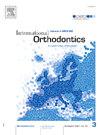Orthodontic treatment of deep bite in mixed dentition and/or early permanent dentition: What about stability? – A systematic review
IF 1.9
Q2 DENTISTRY, ORAL SURGERY & MEDICINE
引用次数: 0
Abstract
Introduction
Deepbite is a vertical malocclusion found alone or in association with other types of sagittal and transverse disorders. With a high relapse tendency, deepbite is considered one of the most challenging malocclusions to treat. It is commonly found in mixed dentition with increased prevalence of 21.3% compared to 14.1% in temporary dentition, thus resulting on unfavourable consequences, preventing the mandible from its full growth potential. Therefore, this systematic review aims to investigate the efficiency of conducting an early correction of deepbite malocclusion in mixed and early permanent dentition on the long-term postretention outcomes.
Material and methods
An electronic search extending from 2000 to July 2024, was performed on the following databases Medline via PubMed, Web of Science, Science Direct and Embase. The search was established on a well-defined research question following PICO principle: population, intervention, comparator and outcome. Search evaluation and the assessment of risk of bias were undertaken in each study following its type and design.
Results
Six studies were included for qualitative analysis, with overall moderate RoB. Two studies treated deepbite in a single phase orthopaedic treatment with eruption guidance appliance in early mixed dentition; two studies orthodontically corrected deepbite at early permanent dentition using fixed multibracket appliance and two studies used a combination of orthopaedic treatment followed by orthodontic treatment targeting both subjects in early mixed and early permanent dentition.
Conclusion
Patients treated in late mixed to early permanent dentition presented better efficacy and greater stability of outcomes than patients treated in the early mixed phase of dentition. More studies must be conducted to support and confirm the results of the included studies.
Prospero under the registration ID
CRD42023408820.
混合牙列及/或早期恒牙列深咬的正畸治疗:稳定性如何?-系统评价。
简介:深咬是一种垂直错牙合发现单独或与其他类型的矢状面和横向障碍。深咬是最具挑战性的牙合之一,复发率高。它常见于混合牙列,与临时牙列的14.1%相比,其患病率增加了21.3%,从而导致不利的后果,阻碍了下颌骨的充分生长潜力。因此,本研究旨在探讨早期矫治混合恒牙列和早期恒牙列深咬错对长期固牙效果的影响。材料和方法:从2000年到2024年7月,通过PubMed, Web of Science, Science Direct和Embase对以下数据库进行了电子检索。搜索是建立在一个定义明确的研究问题以下PICO原则:人口,干预,比较和结果。根据研究的类型和设计,对每项研究进行检索评价和偏倚风险评估。结果:6项研究纳入定性分析,总体罗伯中等。两项研究在早期混合牙列中使用出牙引导器进行一期矫形治疗;两项研究采用固定多支架矫治器对早期恒牙列深咬进行正畸矫正,两项研究针对早期混合恒牙列和早期恒牙列采用矫形治疗后正畸治疗的组合。结论:恒牙列混合晚期至早期治疗的疗效优于恒牙列混合早期治疗。必须进行更多的研究来支持和确认纳入研究的结果。普洛斯彼罗注册id: CRD42023408820。
本文章由计算机程序翻译,如有差异,请以英文原文为准。
求助全文
约1分钟内获得全文
求助全文
来源期刊

International Orthodontics
DENTISTRY, ORAL SURGERY & MEDICINE-
CiteScore
2.50
自引率
13.30%
发文量
71
审稿时长
26 days
期刊介绍:
Une revue de référence dans le domaine de orthodontie et des disciplines frontières Your reference in dentofacial orthopedics International Orthodontics adresse aux orthodontistes, aux dentistes, aux stomatologistes, aux chirurgiens maxillo-faciaux et aux plasticiens de la face, ainsi quà leurs assistant(e)s. International Orthodontics is addressed to orthodontists, dentists, stomatologists, maxillofacial surgeons and facial plastic surgeons, as well as their assistants.
 求助内容:
求助内容: 应助结果提醒方式:
应助结果提醒方式:


